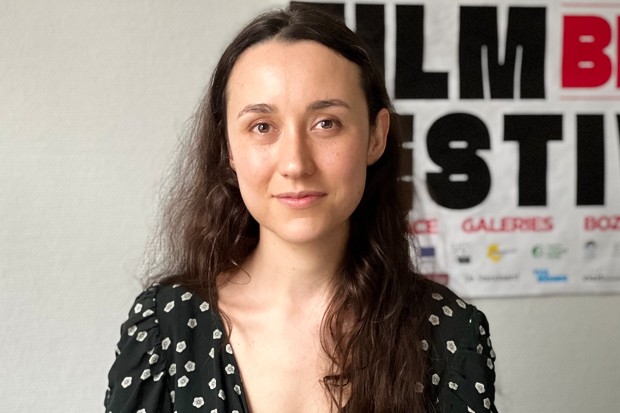Mélanie Delloye • Director of Nightman
"I wanted to work with psychological terror"
- The French filmmaker introduced us to her second feature film, which is a psychological thriller set against a backdrop of Gaelic legends

Presented in the National Competition of the BRIFF, Nightman [+see also:
film review
interview: Mélanie Delloye
film profile] sees young filmmaker Mélanie Delloye throwing herself into genre cinema, with a psychological thriller revolving around marital control and gaslighting, ensconced in a backdrop of Gaelic legends and family secrets.
Cineuropa: Could you describe Nightman to us in a few words?
Mélanie Delloye: It’s a psychological thriller set in Ireland. It’s fundamentally about the relationship – which, at first glance, seems very good - between a young, married couple who move into the childhood home of the husband, who turns out to be pretty toxic.
Is it a bit of a genre film, too?
There are a few horror elements to it. I’m inspired by ‘70s films like Straw Dogs, The Shining and Rosemary's Baby, which were both genre and arthouse films, which, in my mind, was the perfect marriage between fear, anxiety, but also depth for all of the characters.
The film is firmly anchored in one place, which is almost a character in and of itself.
Everything takes place around a small and slightly isolated house, close to a village in Ireland on the edge of a wood. It explores the theme of isolation, obviously, but also the feeling of being an intruder in a village where everyone knows each other. Alex is a foreigner in this place. There’s hunting there, first and foremost, and lots of other things she doesn’t understand, whereas her husband spent his childhood there. Anecdotally, we filmed in Belgium, so we really tried to recreate Ireland. Also, during filming, whether or not our Irish actors really felt like they were at home was the real test!
The other aspect which anchors the film firmly in Ireland, aside for its actors, is the tale referenced in the film, with the Banshee character.
It’s true that there’s a legend which we tell at the beginning of the film, and which really is anchored in Irish mythology. It was important for me to anchor the story amidst all these beliefs. The Banshee is a very well-known character in Ireland - it’s a woman who’s at death’s door, but who also accompanies the dead; a character falling somewhere between good and bad, who’s somewhat ambiguous and frightening but who’s also strangely reassuring. I tried to immerse myself in these places and their culture. I think there’s great power in all these stories and I wanted to include this in the film.
What was it in particular that attracted you to this story?
There were two things: the couple and their toxic relationship. What I was interested in was the idea of gaslighting, when someone manipulates the other psychologically and tries to make them doubt themselves, invalidating their perception of reality. It’s also a film about the night. It’s ultimately a film about a woman who needs to wake up. And there was also a lot of work on childhood trauma and how it can impact who we become.
What made you want to take on a genre film?
It’s true that genre cinema was a new adventure and a challenge for me. Just like in The Shining, I wanted to work with psychological terror. Nightman is also about a place, and a small number of characters. It gave me real freedom to explore things, and to let shots last longer too. We linger on places and time while keeping viewers in suspense. I wanted to embark on something where I could combine my love of the acting game with my love of history, and to try to create new thrills with this film.
What was the biggest challenge you faced with this project?
I think the biggest challenge was having to film under low-budget conditions and within a very limited time-period. We had to shoot the movie within less than 20 days, which is a very short time for a feature film. I have to say, we had a really brilliant team who did an incredible job. There were lots of things that we did manage to do, but it always felt like we were doing them under extremely difficult conditions.
(Translated from French)
Did you enjoy reading this article? Please subscribe to our newsletter to receive more stories like this directly in your inbox.















